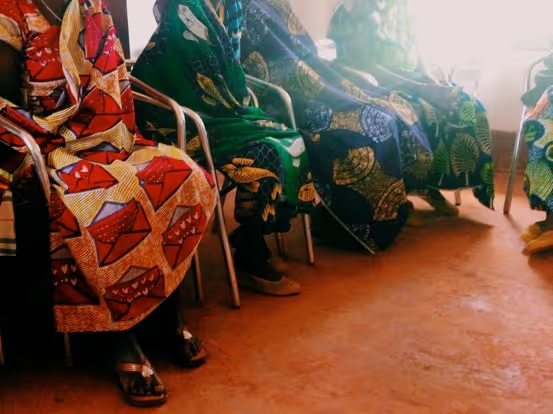Healing psychological scars in the Democratic Republic of Congo

With support from the Humanitarian Innovation Fund, the International Rescue Committee is piloting Cognitive Processing Therapy in eastern DRC, a targeted mental health therapy that gives survivors of sexual violence a new way to manage distressing thoughts and overcome trauma.
A male nurse, Jean de Dieu, sits amongst eight women who have gathered for a group therapy session in a hospital room in South Kivu in eastern Democratic Republic of Congo (DRC).
The women, all survivors of sexual violence, tell him about how they are coping with memories of being raped by soldiers, armed groups and in some cases, members of their own family.
“I try and keep as busy as possible during the day”, explains one survivor, “When I stop working in the evening, I’m haunted by recurring thoughts and unable to sleep.”
“I sing and play music whenever troubling thoughts come back to haunt me” adds another survivor, “I pray for strength to wake up in the morning.”
Jean de Dieu spends over an hour listening patiently and attentively, asking occasional questions and prompting group discussions. When Jean de Dieu closes the weekly therapy session, the women are reluctant to leave.

“This is the first time we have been given the space to talk openly with others who have been through the same traumatic experience,” a survivor explains. “I don’t feel alone anymore, I feel safe and supported here.”
Following the session, Jean heads back to his desk to evaluate the recovery of the sexual survivors. He scores women on their varying levels of trauma to track their progress.
“When I first met with survivors, they had high levels of trauma, and I can already see after a few group sessions, their trauma scores are reducing,” he explains.
Jean de Dieu is one of 14 healthcare professionals who have been trained by the International Rescue Committee in Cognitive Processing Therapy (CPT), an innovative form of therapy adapted specifically to the context of the DRC to help survivors of sexual violence confront and overcome trauma.
“During the therapy training, I realized that I was also suffering from trauma from some of the violence that I have personally witnessed here,” says Jean. “Therapy is just as important as medicine, and it is so important for it to be integrated in the Congolese health system.”
Although peace has now returned to this area of South Kivu, the psychological scars remain. People who have witnessed and experienced years of physical and sexual violence live without access to mental healthcare. Hundreds of thousands of women and adolescent girls across eastern DRC are living in stigma and silence. Unable to communicate or confront trauma, survivors of sexual violence are haunted by “stuck thoughts” and incapable of healing and fulfilling their potential.
A study conducted by the International Rescue Committee (IRC) in partnership with Johns Hopkins University found that providing survivors of sexual violence with CPT resulted in a dramatic decrease in overall trauma symptoms. Adapted specifically to the context in DRC, survivors who benefitted from CPT were twice as likely to experience a decrease in trauma symptoms than those who did not receive the therapy. These women also showed improved ability in carrying out daily tasks, worked 8 more hours per week, and spent 30% more on food – demonstrating a strong improvement in their economic well-being.
The IRC’s Women’s Protection and Empowerment programme has worked in the North and South Kivu provinces of the Democratic Republic of Congo since 2002, providing essential medical care, counselling and emotional support and legal services to over 12,000 survivors of sexual and physical violence since 2009. With support from the Humanitarian Innovation Fund, the IRC is piloting Cognitive Processing Therapy, a targeted mental health therapy that gives survivors of sexual violence a new way to manage distressing thoughts and view past events in a more realistic way to achieve more balanced memories. Approximately 100 survivors will receive Cognitive Processing Therapy services during this pilot project, which will train health service providers to provide Cognitive Processing Therapy through existing health facilities in the DRC. Alongside these services, the IRC also creates social and economic opportunities for women and girls, works with communities to promote supportive environments, and helps to raise their voices through advocacy at local, national and international levels.
Stay updated
Sign up for our newsletter to receive regular updates on resources, news, and insights like this. Don’t miss out on important information that can help you stay informed and engaged.
Related articles


.png)
Explore Elrha
Learn more about our mission, the organisations we support, and the resources we provide to drive research and innovation in humanitarian response.